The talent pool at BW was so rich and deep that I had to break the post listing the books by veterans of the magazine in two posts. Here is the list from 2007 and earlier:
2007
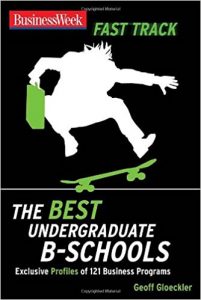 Geoff Gloeckler got the party started with this effort. “This book helped me plan out which schools I would look at to go into business. I feel that they have by far the best rankings out there, even better than U.S. News and World Report, because they dont just rank, they prioritize and explain their rankings thoroughly.” — K. BOYLE, Amazon customer review. “The book has so much relevant information put in a simple, easy to read format. Everything I wanted to know about business schools plus extra. The book gave me a well rounded look, not only academic. Things like activities in the near by area, girl to guy ratios, and intramural activities…. Great book and well put together!” — D. SEATON, Amazon customer review.
Geoff Gloeckler got the party started with this effort. “This book helped me plan out which schools I would look at to go into business. I feel that they have by far the best rankings out there, even better than U.S. News and World Report, because they dont just rank, they prioritize and explain their rankings thoroughly.” — K. BOYLE, Amazon customer review. “The book has so much relevant information put in a simple, easy to read format. Everything I wanted to know about business schools plus extra. The book gave me a well rounded look, not only academic. Things like activities in the near by area, girl to guy ratios, and intramural activities…. Great book and well put together!” — D. SEATON, Amazon customer review.
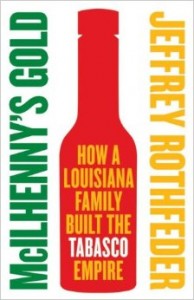 Jeff Rothfeder sizzles.”Despite the company’s ebbing sales and profits even in the midst of a hot-sauce craze, Rothfeder’s tale is balanced and always entertaining, and may please at least some of those who shake a few drops of Tabasco on whatever they’re eating.” PUBLISHERS WEEKLY “Reading this piquant history means you can never again reach for that little bottle without recalling the amazing history fraught within.” – MARK KNOBLAUCH, Booklist
Jeff Rothfeder sizzles.”Despite the company’s ebbing sales and profits even in the midst of a hot-sauce craze, Rothfeder’s tale is balanced and always entertaining, and may please at least some of those who shake a few drops of Tabasco on whatever they’re eating.” PUBLISHERS WEEKLY “Reading this piquant history means you can never again reach for that little bottle without recalling the amazing history fraught within.” – MARK KNOBLAUCH, Booklist

Tony Bianco went shopping. “[The Bully of Bentonville]…is filled with direct quotations from current and former Wal-Mart employees, paraphrased anecdotes from Wal-Mart lore, Sam Walton legends, data from government documents and studies from academic researchers such as Basker. Not a single page…is boring, whether the reader is a Wal-Mart lover, Wal-Mart hater, or a conflicted in-between sometimes shopper.” THE KANSAS CITY STAR “In The Bully of Bentonville Bianco produces the most penetrating examination of Wal-Mart’s business practices and their ripple effects in American society that has been published since Wal-Mart watching became a serious pursuit of the business press and academia.” THE STAR TELEGRAM

Ann Therese Palmer, a devoted grad of Notre Dame, showed her fealty to alma mater. “This book is a great read. It includes letter from early Notre Dame female grads along with other famous ND folks who were there when coeducation began. Included are letters from sports coaches and the first female ND undergraduate.” PAUL BLILEY JR. “This book is amazing! Reading all the stories and experiences of Notre Dame women pioneers, famous Notre Dame graduates, and various administrators is inspiring! Read the book, it’s wonderful!” R. O’CONNOR, BingoBooks

Paul Barrett wrapped this one up on Steve Adler‘s watch at BW. “Paul M. Barrett has written a rich book full of insights into a religion many Americans don’t know enough about.” CHICAGO TRIBUNE “A thoughtful exploration that is both comforting and alarming . . . American Islam reveals the variety of Muslim experience in the U.S., as well as profound aspects of Islam that are underappreciated in this country.” THE WALL STREET JOURNAL “Well wrought and engaging . . . A welcome antidote to the wide spread Islamophobia that has infected so many Americans over the last five years . . . The book makes a compelling argument that the greatest tool in America’s arsenal in the ‘war on terror’ may be its own thriving and thoroughly assimilated Muslim community.” THE WASHINGTON POST BOOK WORLD

Julia Flynn Siler knows a bit about wine, it seems. “Call it Greek tragedy or Shakespearean drama, Biblical strife, Freudian acting out or even soap opera. You wouldn’t be exaggerating, and you wouldn’t be wrong….” ERIC ASIMOV, The New York Times “[A] lesson in business, family, greed and hubris that reads like a thriller novel. You will never look at a glass of wine the same way again.” GEOFF OLDFATHER, Treasure Coast Palm “With stellar reporting and clear, enjoyable writing Julia Flynn Siler… describes the long rise and sharp descent of California’s most iconic vintner … her research is simply outstanding. She captures the scope of Mondavi’s story, which amounts to King Lear in wine country.” W. BLAKE GRAY, Vinography

Larry Light and his bride, Meredith Anthony, proved versatile in fiction. “Ladykiller is an intriguing, compelling and suspenseful crime novel packed with enticing twists and turns to keep you on the edge. The authors have created a powerful thriller that tantalizes with a sense of suspense and a steady flow of action. The characters are believable, finely developed and engaging. Ladykiller is superbly crafted with vivid detail that draws you into the story.” TERRY SOUTH, Quality Reviews
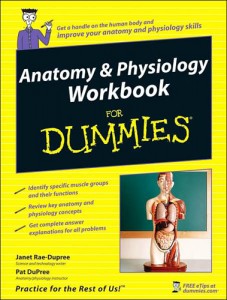
Janet Rae-Dupree and Pat DuPree got physical with this one. “I’m a middle age woman who returned to college and needed help with my Anatomy class this book was a very big help. I couldn’t have passed the class without this book.” — CHRISTY BURKE “I am starting my first year of nursing school and needed some brushing up on my A&P. This book breaks everything down for you. It is simple enough to easily understand but doesn’t become so easy that you are actually learning nothing. I would totally recommend it!” — LILMISSNURSE
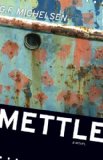
Under the pseudonym G.F. Michelsen [George Michelsen Foy] “pits a commercial sea captain against a broken ship and an insubordinate crew in his disappointing new novel. Lorenzo Fuller captains the Pacific Debenture, a grain freighter, off the coast of southeast Africa and tries to get the wayward and ailing ship back on track. But the memories of the woman he has loved and lost haunt him…. Fans of nautical tales will enjoy the climactic scene, but anyone not enamored of salty dog stories will have a tough time getting their sea legs here.” — PUBLISHERS WEEKLY “Michelsen has written deftly about men struggling with their jobs, their marriages, and society in general, and his latest novel addresses similar themes…. Michelsen’s strong characterizations of Lorenzo, his son, and several crew members inject heightened pathos into the climactic, though not unexpected, conclusion.” — DEBORAH DONOVAN, BOOKLIST
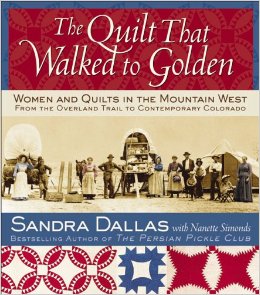 Sandra Dallas, with Nanette Simonds, weaves quite the story. “Written by one of Colorado’s finest writers, our quilted history is well told in The Quilt That Walked to Golden.” — ROCKY MOUNTAIN NEWS “This book not only walks, it talks. And no quilt could have a better author to make it ‘talk’ than Sandra Dallas. A great book.” —PAT SCHROEDER, former member of Congress
Sandra Dallas, with Nanette Simonds, weaves quite the story. “Written by one of Colorado’s finest writers, our quilted history is well told in The Quilt That Walked to Golden.” — ROCKY MOUNTAIN NEWS “This book not only walks, it talks. And no quilt could have a better author to make it ‘talk’ than Sandra Dallas. A great book.” —PAT SCHROEDER, former member of Congress
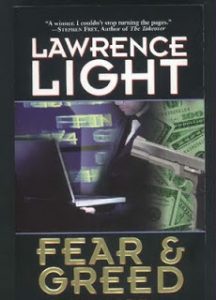 Larry Light addresses timeless topics. “Light brings back intrepid reporter Karen Glick, feature writer for Profit magazine, for a second outing (following Too Rich to Live) with largely satisfying results. The three Reiner sisters, Linda, Ginny and Flo, have created a computer program called Goldring that accurately predicts the stock market, and have used it to make themselves incredibly wealthy. But the digital goose that lays the golden eggs proves deadly…. Light is skillful setting the multiple and complicated plots spinning, and despite the body count he manages to keep the tone light and quick; however, the story—nicely tied up though it is—relies heavily on coincidence and overly talky characters, and much of the supporting cast feel stock. That said, Glick remains a strong, witty heroine; her latest adventure should please fans of Wall Street thrillers.” PUBLISHERS WEEKLY
Larry Light addresses timeless topics. “Light brings back intrepid reporter Karen Glick, feature writer for Profit magazine, for a second outing (following Too Rich to Live) with largely satisfying results. The three Reiner sisters, Linda, Ginny and Flo, have created a computer program called Goldring that accurately predicts the stock market, and have used it to make themselves incredibly wealthy. But the digital goose that lays the golden eggs proves deadly…. Light is skillful setting the multiple and complicated plots spinning, and despite the body count he manages to keep the tone light and quick; however, the story—nicely tied up though it is—relies heavily on coincidence and overly talky characters, and much of the supporting cast feel stock. That said, Glick remains a strong, witty heroine; her latest adventure should please fans of Wall Street thrillers.” PUBLISHERS WEEKLY
Giles Blunt chilled ’em with this. “Set in remote Algonquin Bay, Ontario, Blunt’s compelling fourth crime novel to feature John Cardinal (after Blackfly Season) finds the police detective mourning the death of his wife, an apparent suicid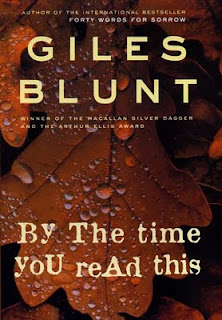 e. Then Cardinal starts receiving cold, hate-filled notes gloating over his loss…. An unexpected yet utterly realistic twist lifts this novel into extremely interesting (and entertaining) territory. Sharp dialogue, complex characters and a satisfying conclusion should help Blunt, who has won Britain’s Silver Dagger and Canada’s Arthur Ellis Award, win new readers in the U.S. PUBLISHERS WEEKLY “The fourth crime novel featuring Detective John Cardinal may give acclaimed Canadian author Blunt the popular recognition he is due.” ALLISON BLOCK, Booklist
e. Then Cardinal starts receiving cold, hate-filled notes gloating over his loss…. An unexpected yet utterly realistic twist lifts this novel into extremely interesting (and entertaining) territory. Sharp dialogue, complex characters and a satisfying conclusion should help Blunt, who has won Britain’s Silver Dagger and Canada’s Arthur Ellis Award, win new readers in the U.S. PUBLISHERS WEEKLY “The fourth crime novel featuring Detective John Cardinal may give acclaimed Canadian author Blunt the popular recognition he is due.” ALLISON BLOCK, Booklist

Steve Hamm rode the tiger. “Business Week senior writer Hamm, who has focused on the emergence of India and China as global economic powers, chose to profile Wipro to tell the story of India’s rising technology industry. Founder Azim Premji built the company from a failing vegetable oil company into a high-tech engineering lab serving clients such as Aviva and Texas Instruments. Premji (who has been called the Bill Gates of India) pioneered the “Wipro Way,” which, much like the famed HP Way, emphasizes ethical values, process excellence, and a central focus on customer relations. On track to become the Wal-Mart of IT services, Wipro is already a fierce global competitor and will be a company to keep an eye on. DAVID SIEGFRIED, Booklist

Gary Weiss found the fraudsters — again. “Never mind Enron—corruption, fraud and towering incompetence are Wall Street’s daily bread and butter, insists this lively j’accuse. Ex-BusinessWeek reporter Weiss (Born to Steal: When the Mafia Hit Wall Street) details the myriad ways the financial industry preys on small investors… He also pillories the industry’s toothless watchdogs—the New York Stock Exchange, a business media addicted to hype and puffery, and a do-nothing Securities and Exchange Commission.” PUBLISHERS WEEKLY “If you’re like half of America, and you own stocks, either directly or through mutual funds, IRAs, or 401(k)s, you may not want to hear what Weiss has to say about the industry–but you’d better read it anyway, for your own good. Weiss, an award-winning investigative journalist, formerly with Business Week, refuses to toe the party line. He describes practices we thought were confined to the fringe dark side of The Street, such as boiler room fraud; overpaid, uncaring fund managers; ineffectual SEC regulations; and Wild West-style hedge funds. The wall that is supposed to separate CEOs, analysts, underwriters, and the media has long disappeared, according to Weiss, as these forces cozy up to form a coalition designed to separate you from your money.” DAVID SIEGFRIED, Booklist
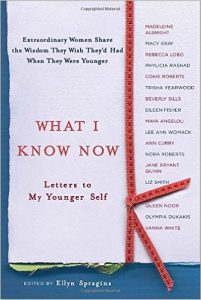 Ellyn Spragins shares the wisdom of extraordinary women. “What these letters offer . . . is hope—hope that those who read them will understand that there is a future where the road not taken is no longer regretted, and, in the end, the choices we make, make us who we are.” — BOSTON GLOBE
Ellyn Spragins shares the wisdom of extraordinary women. “What these letters offer . . . is hope—hope that those who read them will understand that there is a future where the road not taken is no longer regretted, and, in the end, the choices we make, make us who we are.” — BOSTON GLOBE
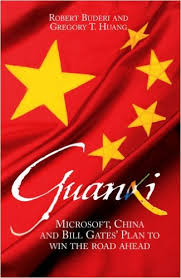 Robert Buderi teams up with Gregory T. Huang to offer insights on China. “Guanxi is a riveting story of Microsoft’s efforts to do research and development in China. It gives you a front row seat on the global war for scientific talent, the future of innovation, and the growing linkages between the U.S. and China…Essential reading for anyone who wants to better understand where the world is headed.” — JEFFREY E. GARTEN, Yale School of Management
Robert Buderi teams up with Gregory T. Huang to offer insights on China. “Guanxi is a riveting story of Microsoft’s efforts to do research and development in China. It gives you a front row seat on the global war for scientific talent, the future of innovation, and the growing linkages between the U.S. and China…Essential reading for anyone who wants to better understand where the world is headed.” — JEFFREY E. GARTEN, Yale School of Management
“Offers valuable insights into how some of the world’s mightiest corporations twist themselves into knots to gain footholds in China… The story has all the elements for a corporate drama.” — BLOOMBERG.COM “The authors argue persuasively that Microsoft’s Beijing Center has played a central role in developing products and served as a model for the company as it expands…Guanxi does show the importance that China has for American high-tech companies.” — BRUCE EINHORN, BusinessWeek
2005
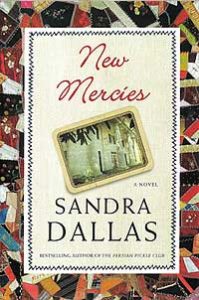
Sandra Dallas struck a chord. “Old fans will recognize Dallas’ trademark leisurely pace in a new setting, a gothic-tinted South instead of the wide-open Midwest, and be pleasantly surprised. The languid pacing will not keep readers from eagerly turning pages to discover why Amalia was murdered and the reasons behind Nora’s failed marriage. Dallas has crafted a honey-and-Spanish-moss-tinged tale certain to please gentle fiction readers who don’t mind a little mystery.” KAITE MEDIATORE, Booklist
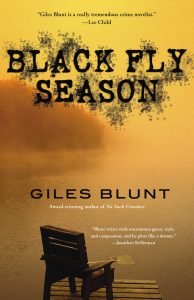 Giles Blunt stings. “Silver Dagger–winner Blunt spins a highly disturbing but truly memorable tale about a Canadian cult’s murder spree…. Based on a true crime, the pulsing, tightly plotted narrative again shows why Blunt (Forty Words for Sorrow) should be considered among the new practitioners of crime drama’s elite.” PUBLISHERS WEEKLY “His characters, even to the lonely guy sitting by himself at the end of the bar, are wonderfully realistic; his pacing never flags; his knowledge of police procedure is accurate without being show-offy; and he leaves the reader not so much with a story as with a glimpse into a perfectly realized world. First-rate.” CONNIE FLETCHER, Booklist
Giles Blunt stings. “Silver Dagger–winner Blunt spins a highly disturbing but truly memorable tale about a Canadian cult’s murder spree…. Based on a true crime, the pulsing, tightly plotted narrative again shows why Blunt (Forty Words for Sorrow) should be considered among the new practitioners of crime drama’s elite.” PUBLISHERS WEEKLY “His characters, even to the lonely guy sitting by himself at the end of the bar, are wonderfully realistic; his pacing never flags; his knowledge of police procedure is accurate without being show-offy; and he leaves the reader not so much with a story as with a glimpse into a perfectly realized world. First-rate.” CONNIE FLETCHER, Booklist

Sheridan Prasso made a mark early with this effort. “Prasso’s ambitious agenda focuses on both Asian women and our perceptions of them, exploring the historical and pop cultural roots of the ‘Asian Mystique’ and ending with a ‘reality tour of Asia.’ Her stories about the lives of Asian women from diverse cultures and socio-economic backgrounds are compelling.” PUBLISHERS WEEKLY “… Prasso explains the symbiotic nature of Western fantasy and Asian fulfillment–often to great profit–of that fantasy, the roles that Asian women play and defy in the West, even the dangerous implications of this still-active fantasy upon global politics. Especially interesting are her observations on the emasculated role of Asian men in Western media–picture, for instance, Jackie Chan even kissing a Western woman.” ALAN MOORES, Booklist

Paul Raeburn shared some tough material. “Raeburn fully discloses the daily struggles he faces with his children — one bipolar, the other chronically depressed — but what emerges is less about them than about him. He is the center of the narrative — a pragmatic journalist with an anger problem and a failed marriage who wants what’s best for his children, but like most parents is groping in the dark for what that is…. Raeburn’s greatest gift is his brave honesty. He challenges all parents to take responsibility and claim their part in their children’s pain.” PUBLISHERS WEEKLY
Larry Light took readers inside. “Light draws us into a Wall Street world full of well-chosen and telling details that only someone who’s had inside access would know. TOO RICH TO LIVE melds humor and suspense in this entertaining mystery that explores the heady worlds of some very rich men from the point of view of one feisty investigative journalist.”CARROLL JOHNSON, Reviewing the Evidence.

“A clear-eyed, thoughtful look at an agency that regulates a quarter of the U.S. economy and, more than any other, has the safety of the American public in its hands. Inside the FDA makes plain how powerful and controversial the Food and Drug Administration has become.”—ELIZABETH MACBRIDE,former managing editor of Crain’s New York Business. “Controversy lives on the FDA’s doorstep, and it knocks loudly— as it did recently with Vioxx—when a drug it approves is involved in consumer deaths. Fran Hawthorne has written a vivid and compelling account of the pressures from politicians, industry, and consumers; the scientific uncertainties; the risk-reward compromises; and the constantly changing legal landscape that influences the agency’s life-and-death decisions.”—CLEM MORGELLO, former senior editor and columnist at Newsweek, former senior editor at Dun’s Review
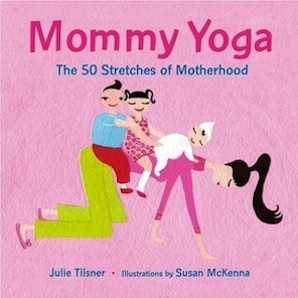 Julie Tilsner stretches the point, hilariously. “I just had my first baby in June and I was given this book by my grandmother. I cannot think of a more perfect book!” — A. NEWKIRK “This book is absolutely charming and very very funny. I laughed, and boy did I need it. 🙂 — GRACE “When this book arrived, I sat down on my comfy chair and read each and every “mommy asana” in one sitting. Then I read it again. And again. Then I shared the book with my neighbors and friends. We’ve never laughed so much. It was wonderful.” — D. TUSZKE
Julie Tilsner stretches the point, hilariously. “I just had my first baby in June and I was given this book by my grandmother. I cannot think of a more perfect book!” — A. NEWKIRK “This book is absolutely charming and very very funny. I laughed, and boy did I need it. 🙂 — GRACE “When this book arrived, I sat down on my comfy chair and read each and every “mommy asana” in one sitting. Then I read it again. And again. Then I shared the book with my neighbors and friends. We’ve never laughed so much. It was wonderful.” — D. TUSZKE
2004
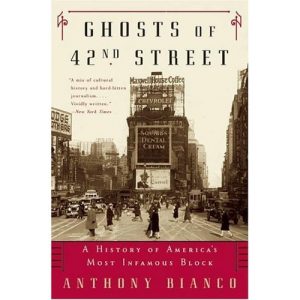 Anthony Bianco summons some haunting memories. “Business writer Bianco (Rainmaker: The Saga of Jeff Beck, Wall Street’s Mad Dog) evokes many wonderful ‘ghosts’ in his moving and dramatic story of the block that runs between Broadway and Eighth Avenue on 42nd Street (although the book is about the entire Times Square area). He starts with impresario Oscar Hammerstein, the German immigrant who built 10 splendid theaters in Manhattan between 1888 and 1914 (and whose fame was eventually eclipsed by that of his grandson, lyricist Oscar Hammerstein II). With dry humor and an admirable lack of sentimentality, the author surveys 42nd Street/Times Square from its heyday as an entertainment center, through its long decline, to its recent revival despite greedy promoters and reluctant politicians, whom he’s not loath to name.” — PUBLISHERS WEEKLY
Anthony Bianco summons some haunting memories. “Business writer Bianco (Rainmaker: The Saga of Jeff Beck, Wall Street’s Mad Dog) evokes many wonderful ‘ghosts’ in his moving and dramatic story of the block that runs between Broadway and Eighth Avenue on 42nd Street (although the book is about the entire Times Square area). He starts with impresario Oscar Hammerstein, the German immigrant who built 10 splendid theaters in Manhattan between 1888 and 1914 (and whose fame was eventually eclipsed by that of his grandson, lyricist Oscar Hammerstein II). With dry humor and an admirable lack of sentimentality, the author surveys 42nd Street/Times Square from its heyday as an entertainment center, through its long decline, to its recent revival despite greedy promoters and reluctant politicians, whom he’s not loath to name.” — PUBLISHERS WEEKLY
2002
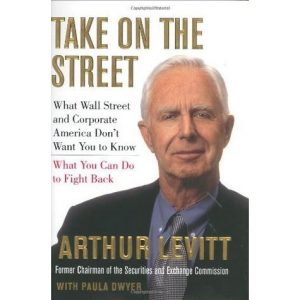 Paula Dwyer toiled with Arthur Levitt on this one. “Levitt, the Securities and Exchange Commission’s longest-serving chairman, supervised stock markets during the late 1990s dot-com boom. As working Americans poured billions into stocks and mutual funds, corporate America devised increasingly opaque strategies for hoarding most of the proceeds. Levitt reveals their tactics in plain language, then spells out how to intelligently invest in mutual funds and the stock market. His advice is aimed squarely at small, individual investors, as he explains how to look for clues of malfeasance in annual reports, understand press releases and draw more from reliable sources. Woven throughout are his recollections about the SEC boardroom fights he oversaw…. should be mandatory reading for anyone with a dollar invested in the stock market.” — PUBLISHERS WEEKLY
Paula Dwyer toiled with Arthur Levitt on this one. “Levitt, the Securities and Exchange Commission’s longest-serving chairman, supervised stock markets during the late 1990s dot-com boom. As working Americans poured billions into stocks and mutual funds, corporate America devised increasingly opaque strategies for hoarding most of the proceeds. Levitt reveals their tactics in plain language, then spells out how to intelligently invest in mutual funds and the stock market. His advice is aimed squarely at small, individual investors, as he explains how to look for clues of malfeasance in annual reports, understand press releases and draw more from reliable sources. Woven throughout are his recollections about the SEC boardroom fights he oversaw…. should be mandatory reading for anyone with a dollar invested in the stock market.” — PUBLISHERS WEEKLY
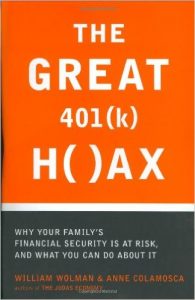 William Wolman and Anne Colamosca join forces in this cautionary tale. “A call for real pension reform and a rethinking of how to provide retirement security in this country.” — BOSTON GLOBE “A hard-hitting evaluation of the 401(k)plans… [Wolman and Colamosca] deliver a disturbing message.” — USA TODAY
William Wolman and Anne Colamosca join forces in this cautionary tale. “A call for real pension reform and a rethinking of how to provide retirement security in this country.” — BOSTON GLOBE “A hard-hitting evaluation of the 401(k)plans… [Wolman and Colamosca] deliver a disturbing message.” — USA TODAY
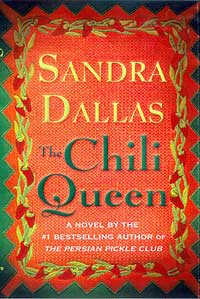
Sandra Dallas bends the genre. “The author tweaks the Western genre with her newest historical novel…. Dallas fleshes out the kind of background characters found in a L’Amour or Grey novel with affection and zest. Sure to garner new fans and satisfy existing ones, this novel is recommended for all public library collections.” — KAITE MEDIATORE, Booklist
2001
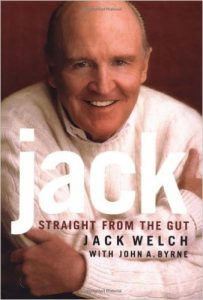 John Byrne helps a business legend cement his legend. “It’s hard to think of a CEO that commands as much respect as Jack Welch. Under his leadership, General Electric reinvented itself several times over by integrating new and innovative practices into its many lines of business. In Jack: Straight from the Gut, Welch, with the help of Business Week journalist John Byrne, recounts his career and the style of management that helped to make GE one of the most successful companies of the last century. Beginning with Welch’s childhood in Salem, Massachusetts, the book quickly progresses from his first job in GE’s plastics division to his ambitious rise up the GE corporate ladder, which culminated in 1981. What comes across most in this autobiography is Welch’s passion for business as well as his remarkable directness and intolerance of what he calls ‘superficial congeniality’–a dislike that would help earn him the nickname ‘Neutron Jack.’ In spite of its 496 pages, Jack: Straight from the Gut is a quick read that any student or manager would do well to consider. Highly recommended.” — HARRY C. EDWARDS, Amazon Reviews
John Byrne helps a business legend cement his legend. “It’s hard to think of a CEO that commands as much respect as Jack Welch. Under his leadership, General Electric reinvented itself several times over by integrating new and innovative practices into its many lines of business. In Jack: Straight from the Gut, Welch, with the help of Business Week journalist John Byrne, recounts his career and the style of management that helped to make GE one of the most successful companies of the last century. Beginning with Welch’s childhood in Salem, Massachusetts, the book quickly progresses from his first job in GE’s plastics division to his ambitious rise up the GE corporate ladder, which culminated in 1981. What comes across most in this autobiography is Welch’s passion for business as well as his remarkable directness and intolerance of what he calls ‘superficial congeniality’–a dislike that would help earn him the nickname ‘Neutron Jack.’ In spite of its 496 pages, Jack: Straight from the Gut is a quick read that any student or manager would do well to consider. Highly recommended.” — HARRY C. EDWARDS, Amazon Reviews
2000
 Sandra Dallas tackles timeless themes. “Loyalty, trust and friendship are the themes of Dallas’s (The Persian Pickle Club) cozy, suspense-driven epistolary novel, set during the Civil War…. As the story unfolds, secrets and mysteries abound, and Alice shares every joy and sorrow with her sister by letter…. her irreverent humor and precise expression will keep readers entertained.” — PUBLISHERS WEEKLY
Sandra Dallas tackles timeless themes. “Loyalty, trust and friendship are the themes of Dallas’s (The Persian Pickle Club) cozy, suspense-driven epistolary novel, set during the Civil War…. As the story unfolds, secrets and mysteries abound, and Alice shares every joy and sorrow with her sister by letter…. her irreverent humor and precise expression will keep readers entertained.” — PUBLISHERS WEEKLY
1999
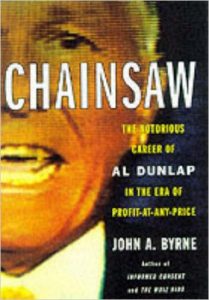 John Byrne takes on a slash-and-burn artist. “It would be hard to imagine a more scathing indictment of one man’s career and character than this blistering saga by Byrne (Informed Consent), a senior writer for Business Week. Dubbed ‘Chainsaw Al’ for his management style, which featured massive layoffs, Dunlap became a business star when he appeared to have turned around the ailing Scott Paper Co. and then arranged its sale to Kimberly-Clark, a move that made millions for Scott’s shareholders and executives. After leaving Scott, Dunlap was recruited by mutual fund manager Michael Price to improve the lethargic stock price of Sunbeam, and Dunlap immediately went to work, slashing thousands of jobs and shutting dozens of plants…. During his career, Dunlap created no shortage of enemies, who were more than willing to share their views with Byrne. Byrne captures the chaos that became Sunbeam in this sizzling tale of what can happen when greed trumps all other management considerations.” — PUBLISHERS WEEKLY
John Byrne takes on a slash-and-burn artist. “It would be hard to imagine a more scathing indictment of one man’s career and character than this blistering saga by Byrne (Informed Consent), a senior writer for Business Week. Dubbed ‘Chainsaw Al’ for his management style, which featured massive layoffs, Dunlap became a business star when he appeared to have turned around the ailing Scott Paper Co. and then arranged its sale to Kimberly-Clark, a move that made millions for Scott’s shareholders and executives. After leaving Scott, Dunlap was recruited by mutual fund manager Michael Price to improve the lethargic stock price of Sunbeam, and Dunlap immediately went to work, slashing thousands of jobs and shutting dozens of plants…. During his career, Dunlap created no shortage of enemies, who were more than willing to share their views with Byrne. Byrne captures the chaos that became Sunbeam in this sizzling tale of what can happen when greed trumps all other management considerations.” — PUBLISHERS WEEKLY
1997
 Elizabeth Ehrlich remembers. “Ehrlich … writes with humor and passion about her journey from ambivalent Jew to a woman who observes tradition and teaches her children about their ethnic heritage. Her story begins when she meets Miriam, her future mother-in-law, a Polish Holocaust survivor who ‘guarded culinary specialties in her mind during years when possession and certainties were ripped from her hands.’ Through Miriam, Ehrlich awakens to dormant memories and traditions in her past and gradually decides that her own family life would have greater meaning if she made her kitchen kosher.” SUSAN DEARSTYNE — Library Journal “Ehrlich’s own story covers her transformation from a child whose family lit Sabbath candles but went boating on Yom Kippur, to an adult who chooses an Orthodox life marked by ambivalence about the rigors of being kosher and pride in what she is passing on to her children. Recipes for Honey Cake, Noodle Pudding, and many others are buried treasures hidden among Ehrlich’s intense words…. Miriam’s Kitchen is a gripping and gratifying memoir of food, life, tragedy, and family survival. — DANA JACOBI, Amazon Reviews
Elizabeth Ehrlich remembers. “Ehrlich … writes with humor and passion about her journey from ambivalent Jew to a woman who observes tradition and teaches her children about their ethnic heritage. Her story begins when she meets Miriam, her future mother-in-law, a Polish Holocaust survivor who ‘guarded culinary specialties in her mind during years when possession and certainties were ripped from her hands.’ Through Miriam, Ehrlich awakens to dormant memories and traditions in her past and gradually decides that her own family life would have greater meaning if she made her kitchen kosher.” SUSAN DEARSTYNE — Library Journal “Ehrlich’s own story covers her transformation from a child whose family lit Sabbath candles but went boating on Yom Kippur, to an adult who chooses an Orthodox life marked by ambivalence about the rigors of being kosher and pride in what she is passing on to her children. Recipes for Honey Cake, Noodle Pudding, and many others are buried treasures hidden among Ehrlich’s intense words…. Miriam’s Kitchen is a gripping and gratifying memoir of food, life, tragedy, and family survival. — DANA JACOBI, Amazon Reviews
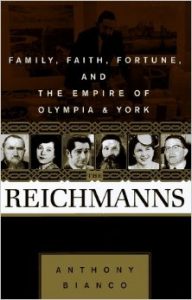 Anthony Bianco sallies into the northland. “A decade ago, the Reichmanns of Toronto were ranked as one of the 10 wealthiest families in the world. Olympia & York, the five brothers’ flagship real estate company, had major developments throughout the world. The story of 0 & Y’s collapse has already been told well by Peter Foster in Towers of Debt: The Rise and Fall of the Reichmanns (1993) and by Walter Stewart in Too Big to Fail: Olympia & York, the Story behind the Headlines (1993). Both of those authors sketched in details of the Reichmann family history, but Bianco delves deep into the Reichmann genealogy, beginning during the ‘golden age of Hungarian Jewry’ in the 1600s. He chronicles how the family prospered, first as egg merchants in Vienna and then, after fleeing the Nazis to Tangier, as currency traders. The Reichmanns are ultra-Orthodox Jews, and Bianco focuses on their beliefs, showing how they were able to balance their insular life in Toronto with the demands of a worldwide real estate empire.” — DAVID ROUSE, Booklist
Anthony Bianco sallies into the northland. “A decade ago, the Reichmanns of Toronto were ranked as one of the 10 wealthiest families in the world. Olympia & York, the five brothers’ flagship real estate company, had major developments throughout the world. The story of 0 & Y’s collapse has already been told well by Peter Foster in Towers of Debt: The Rise and Fall of the Reichmanns (1993) and by Walter Stewart in Too Big to Fail: Olympia & York, the Story behind the Headlines (1993). Both of those authors sketched in details of the Reichmann family history, but Bianco delves deep into the Reichmann genealogy, beginning during the ‘golden age of Hungarian Jewry’ in the 1600s. He chronicles how the family prospered, first as egg merchants in Vienna and then, after fleeing the Nazis to Tangier, as currency traders. The Reichmanns are ultra-Orthodox Jews, and Bianco focuses on their beliefs, showing how they were able to balance their insular life in Toronto with the demands of a worldwide real estate empire.” — DAVID ROUSE, Booklist
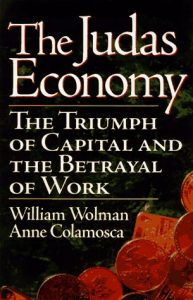 William Wolman and Anne Colamosca vent about economic betrayal. “The authors castigate rightly supply-side economics as a policy of lowering tax rates for the rich and at the same time as a money-raising vehicle for the GOP. They show clearly that small businesses are not the cornerstone of job creation…. A very revealing and necessary book. Not to be missed.” — LUC REYNAERT, Amazon reviews “How ironic it is to go back to this book written in 1997 and see the entire dynamic of outsourcing and globalization analyzed before it became evident to the rest of us. Even today, however, it is not obsolete because they not only predicted the events but also demonstrated why globalization would have this consequence. They also provide a critical analysis of reengineering which demonstrated the technique as little more that an excuse for downsizing jobs and wages. Even now this book is a must read on globalization.” — BILL MURPHY, Amazon reviews
William Wolman and Anne Colamosca vent about economic betrayal. “The authors castigate rightly supply-side economics as a policy of lowering tax rates for the rich and at the same time as a money-raising vehicle for the GOP. They show clearly that small businesses are not the cornerstone of job creation…. A very revealing and necessary book. Not to be missed.” — LUC REYNAERT, Amazon reviews “How ironic it is to go back to this book written in 1997 and see the entire dynamic of outsourcing and globalization analyzed before it became evident to the rest of us. Even today, however, it is not obsolete because they not only predicted the events but also demonstrated why globalization would have this consequence. They also provide a critical analysis of reengineering which demonstrated the technique as little more that an excuse for downsizing jobs and wages. Even now this book is a must read on globalization.” — BILL MURPHY, Amazon reviews
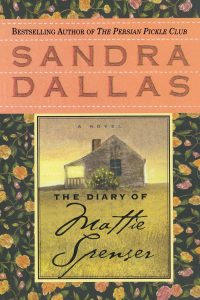 Sandra Dallas explores down-home themes. “The buoyancy and simple, uncloying sweetness of spirit of Dallas’s appealing protagonist–the young wife of a homesteader in Colorado Territory–give a bright, fresh shading to the tragedies and small sharp joys of 19th-century frontier life. Again, as in The Persian Pickle Club (1995), Dallas has caught the lilt and drift of regional speech…. Tragedies and sad little domestic dramas are muffled within the decency and humanity of a character whose understanding–but not essence–changes with events.” — KIRKUS REVIEWS
Sandra Dallas explores down-home themes. “The buoyancy and simple, uncloying sweetness of spirit of Dallas’s appealing protagonist–the young wife of a homesteader in Colorado Territory–give a bright, fresh shading to the tragedies and small sharp joys of 19th-century frontier life. Again, as in The Persian Pickle Club (1995), Dallas has caught the lilt and drift of regional speech…. Tragedies and sad little domestic dramas are muffled within the decency and humanity of a character whose understanding–but not essence–changes with events.” — KIRKUS REVIEWS
1996
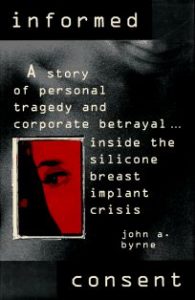 John Byrne humanizes an ugly chapter in business history. “This wrenching, compelling personal story raises vital questions for corporate ethics programs. Michigan executive John Swanson, creator and overseer of Dow Corning’s ethics program, faced a moral crisis when his wife, Colleen, began experiencing problems that she attributed to her Dow-manufactured silicone breast implants: severe migraines, debilitating joint and back pain, numbness in her arms and hands and extreme fatigue. In 1991, she underwent removal of the leaking implants, which had been in her chest for 17 years. Her husband then recused himself from Dow’s silicone breast implant business, telling his employers that he would no longer help the company defend itself against the growing onslaught of criticism and lawsuits. He had gradually come to believe that Dow had failed to fully inform women of the known risks and had ignored numerous opportunities to get out of the implant business gracefully.” — PUBLISHERS WEEKLY
John Byrne humanizes an ugly chapter in business history. “This wrenching, compelling personal story raises vital questions for corporate ethics programs. Michigan executive John Swanson, creator and overseer of Dow Corning’s ethics program, faced a moral crisis when his wife, Colleen, began experiencing problems that she attributed to her Dow-manufactured silicone breast implants: severe migraines, debilitating joint and back pain, numbness in her arms and hands and extreme fatigue. In 1991, she underwent removal of the leaking implants, which had been in her chest for 17 years. Her husband then recused himself from Dow’s silicone breast implant business, telling his employers that he would no longer help the company defend itself against the growing onslaught of criticism and lawsuits. He had gradually come to believe that Dow had failed to fully inform women of the known risks and had ignored numerous opportunities to get out of the implant business gracefully.” — PUBLISHERS WEEKLY
1995
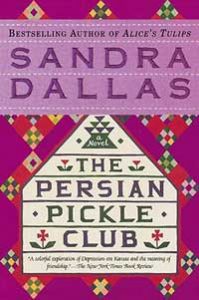 Sandra Dallas goes exotic — only seemingly. “This entertaining second novel from the author of the well-received Buster Midnight’s Cafe could be a sleeper. Set in Depression-era Kansas and made vivid with the narrator’s humorous down-home voice, it’s a story of loyalty and friendship in a women’s quilting circle…. The result is a simple but endearing story that depicts small-town eccentricities with affection and adds dazzle with some late-breaking surprises. Dallas hits all the right notes, combining an authentic look at the social fabric of Depression-era life with a homespun suspense story.” — PUBLISHERS WEEKLY
Sandra Dallas goes exotic — only seemingly. “This entertaining second novel from the author of the well-received Buster Midnight’s Cafe could be a sleeper. Set in Depression-era Kansas and made vivid with the narrator’s humorous down-home voice, it’s a story of loyalty and friendship in a women’s quilting circle…. The result is a simple but endearing story that depicts small-town eccentricities with affection and adds dazzle with some late-breaking surprises. Dallas hits all the right notes, combining an authentic look at the social fabric of Depression-era life with a homespun suspense story.” — PUBLISHERS WEEKLY
 John Byrne looks coolly at the wonder boys.” An unsparing post-mortem on a group of organization men who played an influential, if not always constructive, role in the postwar history of US business and government…. With the postwar era’s best and brightest now gone to varying rewards, Byrne offers a harsh appraisal of their legacy. In particular, he takes the Whiz Kids and their disciples to task for putting near-blind faith in the decisive power of numbers and arrogantly imposing severe financial constraints on enterprises whose bottom-line results could almost certainly have been improved by allowing fallible human beings to exercise their intuition and creativity. An impressive and instructive look at a generation that apparently cast a long dark shadow on the domestic landscape.” — KIRKUS REVIEWS
John Byrne looks coolly at the wonder boys.” An unsparing post-mortem on a group of organization men who played an influential, if not always constructive, role in the postwar history of US business and government…. With the postwar era’s best and brightest now gone to varying rewards, Byrne offers a harsh appraisal of their legacy. In particular, he takes the Whiz Kids and their disciples to task for putting near-blind faith in the decisive power of numbers and arrogantly imposing severe financial constraints on enterprises whose bottom-line results could almost certainly have been improved by allowing fallible human beings to exercise their intuition and creativity. An impressive and instructive look at a generation that apparently cast a long dark shadow on the domestic landscape.” — KIRKUS REVIEWS
1991
Anthony Bianco rattles a few cages. “Unlike other Wall Street dealmakers who convinced themselves that the 1980s manic corporate takeover wave was restoring corporate America’s entrepreneurial vigor, flamboyant investment banker Jeff  Beck knew it was a con, a game run on greed and ego. But Beck, who as Drexel Burnham’s “Mad Dog” rainmaker presided over the $8-billion leveraged buyout of Beatrice Foods, played the game with a vengeance, driven by a desperate craving for social status. He circulated extravagant fantasies about himself, claiming heroism as a U.S. Special Forces captain in Vietnam and spreading the fabrication that he had assembled a vast secret corporate empire called Rosebud. Though Beck never fought in Vietnam, actor-producer Michael Douglas, taken in by his tall tale, nearly made a movie about him. In a gripping parable of Reagan-era wishful thinking masquerading as optimism, this searching biography by Business Week reporter Bianco lays bare the deep psychic wounds and family skeletons that contributed to one rainmaker’s rise and fall.” — PUBLISHERS WEEKLY
Beck knew it was a con, a game run on greed and ego. But Beck, who as Drexel Burnham’s “Mad Dog” rainmaker presided over the $8-billion leveraged buyout of Beatrice Foods, played the game with a vengeance, driven by a desperate craving for social status. He circulated extravagant fantasies about himself, claiming heroism as a U.S. Special Forces captain in Vietnam and spreading the fabrication that he had assembled a vast secret corporate empire called Rosebud. Though Beck never fought in Vietnam, actor-producer Michael Douglas, taken in by his tall tale, nearly made a movie about him. In a gripping parable of Reagan-era wishful thinking masquerading as optimism, this searching biography by Business Week reporter Bianco lays bare the deep psychic wounds and family skeletons that contributed to one rainmaker’s rise and fall.” — PUBLISHERS WEEKLY
1990
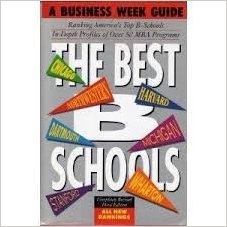 John Byrne builds a franchise for BW. “Among the several guides to graduate business schools, Business Week‘s has always been a favorite. Unlike Barron‘s and the Graduate Management Admissions Council’s comprehensive and descriptive directories, Business Week‘s is selective and evaluative.” — DAVID ROUSE, Booklist
John Byrne builds a franchise for BW. “Among the several guides to graduate business schools, Business Week‘s has always been a favorite. Unlike Barron‘s and the Graduate Management Admissions Council’s comprehensive and descriptive directories, Business Week‘s is selective and evaluative.” — DAVID ROUSE, Booklist
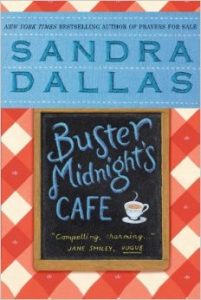 Sandra Dallas bursts into fiction. “Dallas’s first novel depicts a remarkable cluster of enduring friendships that may strike the modern urban reader as implausible, but accurately reflect the flavor of a small town and its inbred relationships. If the denouement seems predictable, Dallas, whose work calls to mind Fannie Flagg’s Fried Green Tomatoes at the Whistle-Stop Cafe , is nonetheless a stylist to be reckoned with.” — PUBLISHERS WEEKLY
Sandra Dallas bursts into fiction. “Dallas’s first novel depicts a remarkable cluster of enduring friendships that may strike the modern urban reader as implausible, but accurately reflect the flavor of a small town and its inbred relationships. If the denouement seems predictable, Dallas, whose work calls to mind Fannie Flagg’s Fried Green Tomatoes at the Whistle-Stop Cafe , is nonetheless a stylist to be reckoned with.” — PUBLISHERS WEEKLY
1990
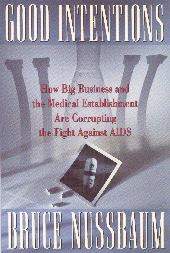 Bruce Nussbaum takes on one of the most troubling issues of the era. “… Nussbaum blames the failure to find a drug effective against AIDS on an unholy alliance forged among the National Institutes of Health, the FDA, elite biomedical centers and the big drug companies. AZT, the toxic, immunosuppressive anti-AIDS drug developed by Burroughs Wellcome, probably offers only short-term, transitory benefits to some patients, he charges. A hard-hitting, shocking look at profit-oriented AIDS research, this brisk journalistic account also tours a medical underground in which grass-roots organizations offer various unapproved drugs to people with AIDS. In this informal network, claims Nussbaum ( The World After Oil ), a model for quick testing of drugs is emerging that, if widely implemented, could revolutionize the treatment of other diseases. — PUBLISHERS WEEKLY
Bruce Nussbaum takes on one of the most troubling issues of the era. “… Nussbaum blames the failure to find a drug effective against AIDS on an unholy alliance forged among the National Institutes of Health, the FDA, elite biomedical centers and the big drug companies. AZT, the toxic, immunosuppressive anti-AIDS drug developed by Burroughs Wellcome, probably offers only short-term, transitory benefits to some patients, he charges. A hard-hitting, shocking look at profit-oriented AIDS research, this brisk journalistic account also tours a medical underground in which grass-roots organizations offer various unapproved drugs to people with AIDS. In this informal network, claims Nussbaum ( The World After Oil ), a model for quick testing of drugs is emerging that, if widely implemented, could revolutionize the treatment of other diseases. — PUBLISHERS WEEKLY
1989
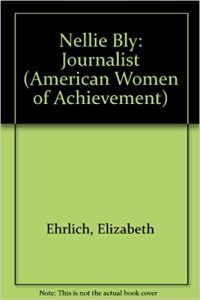 Elizabeth Ehrlich takes a look at a journalistic trailblazer. “The story of Elizabeth Cochrane, the innovative female journalist who, as Nellie Bly, built a career in an age in which women were socially assigned to running households. She tackled the problem of working conditions in factories by working at menial laboring jobs to give firsthand accounts, and had herself admitted as a patient to explore the conditions in mental institutions. Her remarkable courage and thorough reports and feature stories provoked much controversy and led to many important reforms…. Cochrane’s life is accurately documented with an interesting mix of her unique professional exploits and personal difficulties. Her outstanding achievements both as a woman and as a journalist should provide inspirational reading. — JUDIE PORTER, School Library Journal
Elizabeth Ehrlich takes a look at a journalistic trailblazer. “The story of Elizabeth Cochrane, the innovative female journalist who, as Nellie Bly, built a career in an age in which women were socially assigned to running households. She tackled the problem of working conditions in factories by working at menial laboring jobs to give firsthand accounts, and had herself admitted as a patient to explore the conditions in mental institutions. Her remarkable courage and thorough reports and feature stories provoked much controversy and led to many important reforms…. Cochrane’s life is accurately documented with an interesting mix of her unique professional exploits and personal difficulties. Her outstanding achievements both as a woman and as a journalist should provide inspirational reading. — JUDIE PORTER, School Library Journal
1988
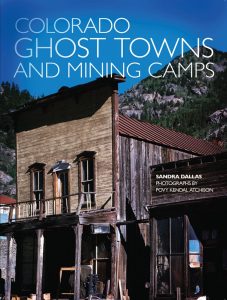 Sandra Dallas and her daughter, Kendall Atchison, explore their favorite state’s haunts. “Prize-winning author Sandra Dallas was dubbed ‘a quintessential American voice’ by Jane Smiley, in Vogue Magazine. Sandra’s novels with their themes of loyalty, friendship, and human dignity have been translated into a dozen foreign languages and have been optioned for films.” This one graces my coffee table in Silverthorne, Colorado. -JW
Sandra Dallas and her daughter, Kendall Atchison, explore their favorite state’s haunts. “Prize-winning author Sandra Dallas was dubbed ‘a quintessential American voice’ by Jane Smiley, in Vogue Magazine. Sandra’s novels with their themes of loyalty, friendship, and human dignity have been translated into a dozen foreign languages and have been optioned for films.” This one graces my coffee table in Silverthorne, Colorado. -JW
1987
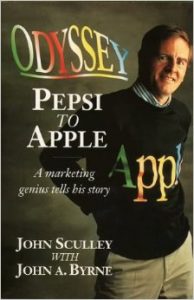 John Byrne lends a hand to another business legend with this one. “The chairman and CEO of Apple Computer, with the aid of a Business Week editor, vividly describes how, after working as an executive for Pepsi-Cola, developing winning strategies in the Cola Wars, and being promoted to president at age 38, he abandoned a ‘second-wave’ company to join Apple, a ‘third-wave’ firm epitomizing flexibility, creativity, and innovation. Sculley tells of his mistakes, failings, and successes and ends chapters with lessons in management or marketing. Highly recommended for business students and anyone curious about a CEO’s life.” — LIBRARY JOURNAL
John Byrne lends a hand to another business legend with this one. “The chairman and CEO of Apple Computer, with the aid of a Business Week editor, vividly describes how, after working as an executive for Pepsi-Cola, developing winning strategies in the Cola Wars, and being promoted to president at age 38, he abandoned a ‘second-wave’ company to join Apple, a ‘third-wave’ firm epitomizing flexibility, creativity, and innovation. Sculley tells of his mistakes, failings, and successes and ends chapters with lessons in management or marketing. Highly recommended for business students and anyone curious about a CEO’s life.” — LIBRARY JOURNAL
1986
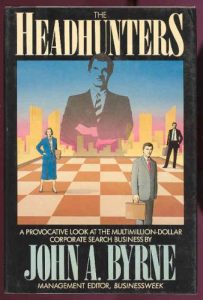 John Byrne sleuths around in the world executive search. “Executive search firms, less respectfully known as headhunters, have become a significant factor in the hiring and mobility of executive talent in the past 20 years. Through profiles of top personalities and firms and stories of top level searches, Byrne illustrates who executive searchers are and how they operate. An addendum describes the top ten executive search firms in the United States. The book seems to be based primarily on interviews with principals and is basically reportorial rather than analytic, but Byrne pulls no punches in revealing the tactics and weak points of headhunting.” — ELIN B. CHRISTIANSON, Library Journal
John Byrne sleuths around in the world executive search. “Executive search firms, less respectfully known as headhunters, have become a significant factor in the hiring and mobility of executive talent in the past 20 years. Through profiles of top personalities and firms and stories of top level searches, Byrne illustrates who executive searchers are and how they operate. An addendum describes the top ten executive search firms in the United States. The book seems to be based primarily on interviews with principals and is basically reportorial rather than analytic, but Byrne pulls no punches in revealing the tactics and weak points of headhunting.” — ELIN B. CHRISTIANSON, Library Journal
1985
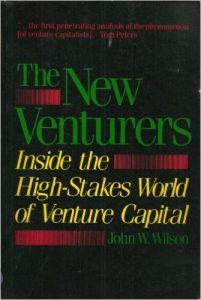 John W. “Jack” Wilson makes history. “In the mid 80s John Wilson published this book about venture capital. At the time, it was about business and how venture capital works. It has now become a history book and it shows how Silicon Valley developed in part thanks to venture capital. It is full of anecdotes, facts and figures. A great book…” — HERVE LEBRET
John W. “Jack” Wilson makes history. “In the mid 80s John Wilson published this book about venture capital. At the time, it was about business and how venture capital works. It has now become a history book and it shows how Silicon Valley developed in part thanks to venture capital. It is full of anecdotes, facts and figures. A great book…” — HERVE LEBRET
1984
 Sandra Dallas goes knocking on history’s doors. “Few books can show so vividly the tenor of social change, for the pictures give an intimate account of how living and styles changed in three generations of families in Denver, Colorado.”
Sandra Dallas goes knocking on history’s doors. “Few books can show so vividly the tenor of social change, for the pictures give an intimate account of how living and styles changed in three generations of families in Denver, Colorado.”
1983
 Bruce Nussbaum looks to the future. “… I found ”The World After Oil’ to be a clear-eyed examination of the direction in which the world is hurtling. As Mr. Nussbaum points out, his analysis is not simply an exercise in fanciful futurism. His time horizon remains within the 20th century, and his telling examples – as well as the headlines in each morning’s newspaper – suggest that the future depicted by him already is taking shape around us.” — JAMES ANDREWS, Christian Science Monitor
Bruce Nussbaum looks to the future. “… I found ”The World After Oil’ to be a clear-eyed examination of the direction in which the world is hurtling. As Mr. Nussbaum points out, his analysis is not simply an exercise in fanciful futurism. His time horizon remains within the 20th century, and his telling examples – as well as the headlines in each morning’s newspaper – suggest that the future depicted by him already is taking shape around us.” — JAMES ANDREWS, Christian Science Monitor
1980
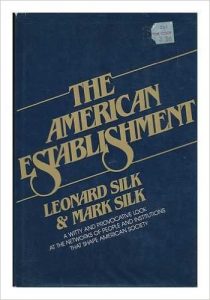 Leonard Silk and son Mark peek under the velvet curtains. “The Silks’ conclusions? In short, the ‘Establishment’ does, indeed exist and seeks — with mixed success — to serve the public weal. It is, they say, a third force between business and politics.” — BENJAMIN WELLES, Christian Science Monitor “The American Establishment, according to the Silks, is alive and well-with-us and best left to pursue its ‘disinterested’ interests unobserved!” — KIRKUS REVIEWS
Leonard Silk and son Mark peek under the velvet curtains. “The Silks’ conclusions? In short, the ‘Establishment’ does, indeed exist and seeks — with mixed success — to serve the public weal. It is, they say, a third force between business and politics.” — BENJAMIN WELLES, Christian Science Monitor “The American Establishment, according to the Silks, is alive and well-with-us and best left to pursue its ‘disinterested’ interests unobserved!” — KIRKUS REVIEWS
Bruce Nussbaum headed the BW team that produced “The Decline of U.S. Power (and what we can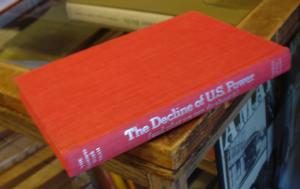 do about it).” Bruce edited work by Ed Mervosh, Jack Kramer, Lenny Glynn, Lewis Beman, William Wolman and Lewis Young.
do about it).” Bruce edited work by Ed Mervosh, Jack Kramer, Lenny Glynn, Lewis Beman, William Wolman and Lewis Young.
1979
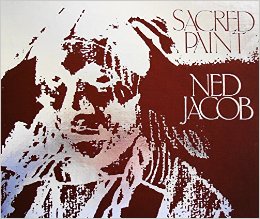 Sandra Dallas teamed up with illustrator Ned Jacob on this one. It won the National Cowboy Hall of Fame Western Heritage Wrangler Award.
Sandra Dallas teamed up with illustrator Ned Jacob on this one. It won the National Cowboy Hall of Fame Western Heritage Wrangler Award.
1975
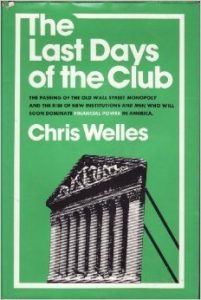 Chris Welles takes on Wall Street. “Welles’ massive analysis of the crises and trends of the last five years among the big money men charts the gradual replacement of the New York Stock Exchange as the linchpin of American capitalism by the ongoing consolidation and growth of commercial banking.” — KIRKUS REVIEWS
Chris Welles takes on Wall Street. “Welles’ massive analysis of the crises and trends of the last five years among the big money men charts the gradual replacement of the New York Stock Exchange as the linchpin of American capitalism by the ongoing consolidation and growth of commercial banking.” — KIRKUS REVIEWS
1974
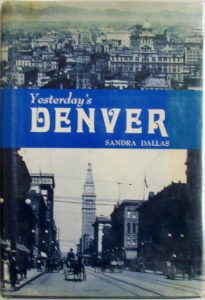 Sandra Dallas waxes nostalgic about her favorite city. Sandra is the recipient of the Women Writing the West Willa Award for New Mercies, and two-time winner of the Western Writers of America Spur Award, for The Chili Queen and Tallgrass. In addition, she was a finalist for the Colorado Book Award, the Mountain and Plains Booksellers Assn. Award, and a four-time finalist for the Women Writing the West Willa Award.
Sandra Dallas waxes nostalgic about her favorite city. Sandra is the recipient of the Women Writing the West Willa Award for New Mercies, and two-time winner of the Western Writers of America Spur Award, for The Chili Queen and Tallgrass. In addition, she was a finalist for the Colorado Book Award, the Mountain and Plains Booksellers Assn. Award, and a four-time finalist for the Women Writing the West Willa Award.
1971
 Sandra Dallas finds some intriguing old sites in a Denver suburb where few such places can be found nowadays.
Sandra Dallas finds some intriguing old sites in a Denver suburb where few such places can be found nowadays.
1970
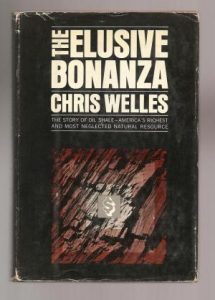 Chris Welles makes his mark — with some controversy. LIFE fired him after he sold a piece that became this book to Harper’s Magazine. Not only a distinguished journalist, he was also a talented teacher of many at the Columbia University Graduate School of Journalism, including me.
Chris Welles makes his mark — with some controversy. LIFE fired him after he sold a piece that became this book to Harper’s Magazine. Not only a distinguished journalist, he was also a talented teacher of many at the Columbia University Graduate School of Journalism, including me.
1967
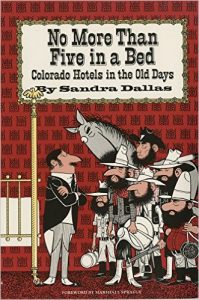
Sandra Dallas peeks behind a few old doors. “Both entertaining reading and a most useful guide
.” — DENVER POST “Every page makes entertaining reading.”–
DALLAS NEWS “Amusing and informative and a fine way to fill an evening.
“— CHICAGO TRIBUNE “The book is light, frothy and pleasant to read.”– ST. LOUIS POST DISPATCH




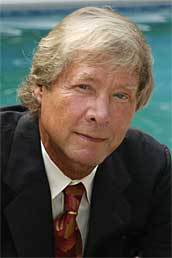
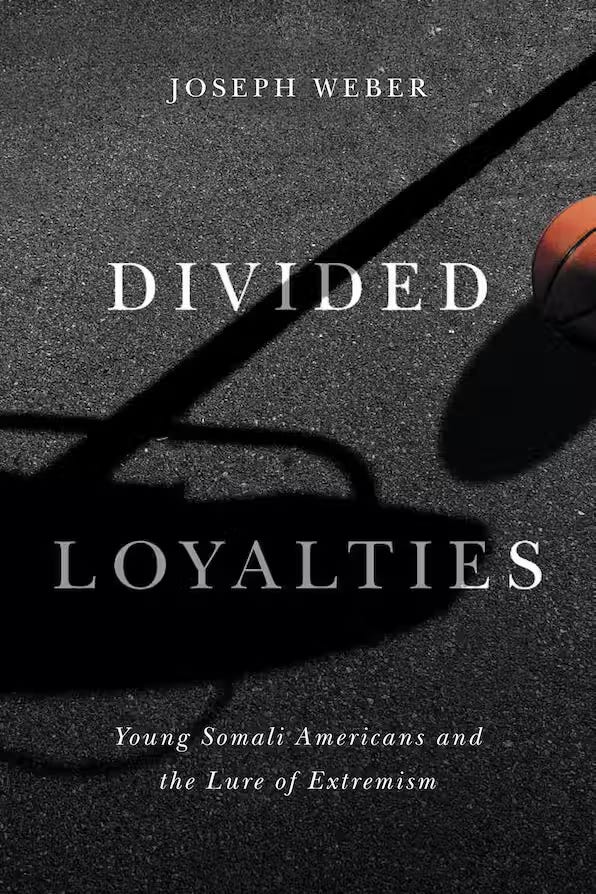
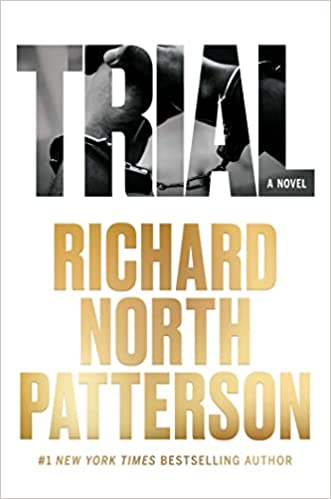






















 Anthony Bianco
Anthony Bianco






















